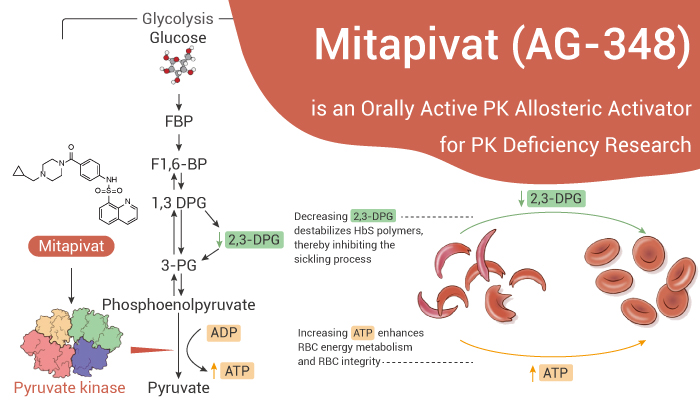PK (Pyruvate Kinase) is an enzyme that catalyzes the conversion of phosphoenolpyruvate and ADP to pyruvate and ATP in glycolysis. Importantly, Pyruvate kinase deficiency is a glycolytic enzymopathy that is a lifelong chronic hemolytic anemia with severe comorbidities. Specifically, PK deficiency is an autosomal recessive disease, and patients are either homozygous or more commonly, compound heterozygous for 2 mutant PK-R alleles. However, Various experimental therapies, including gene therapy, have been proposed for PK deficiency. But there are no approved drugs that directly target mutated PK-R.

This article will introduce an orally active PK allosteric activator, Mitapivat.
Mitapivat (AG-348) is a potent activator of PK-R. Besides, Mitapivat (0.1 nM-100 µM; 16 h) increases PK-R activity in a dose-dependent manner with an AC50 of 62 nM. Moreover, Mitapivat (0.1 nM-10 µM; 16 h) Consistently increases ATP levels in a dose-dependent manner with an AC50 of 10.9 nM. In addition, Mitapivat (1, 10, 50, 150 mg/kg; p.o.; twice daily for 7 days) activates WT PK-R in RBCs from healthy donors and C57/BL6 mice.
Mitapivat (50 mg/kg; p.o.; single daily for 3 weeks) increases the expression of pyruvate kinase isoforms, ROS level in erythrocytes, the word of PKM2 in polychromatic and orthochromatic erythroblasts of Hbbth3/+ mice. Besides, Mitapivat (50 mg/kg; p.o.; twice daily for 21 days) ameliorates ineffective erythropoiesis and anemia in Hbbth3/+ mice and increases ATP, reduces ROS production, as well as reduces markers of mitochondrial dysfunction associated with improved mitochondrial clearance.
In a word, Mitapivat is an orally active pyruvate kinase allosteric activator and has the potential for the research of β-thalassemia and PK deficiency.
Reference:
[1] Kung C, et al. Blood. 2017 Sep 14;130(11):1347-1356.
[2] Matte A, et al. J Clin Invest. 2021 May 17;131(10):e144206.